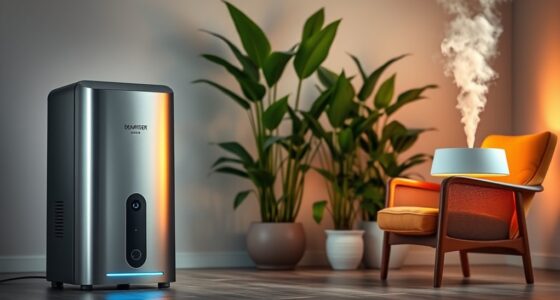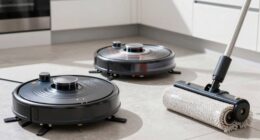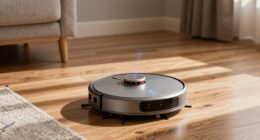Ultrasonic humidifiers use high-frequency vibrations to create a fine, cool mist without heat, making them quiet and energy-efficient, ideal for small spaces. Evaporative humidifiers draw air through a wet filter, releasing moisture naturally while being suitable for larger rooms. They tend to be noisier but help regulate humidity better and produce less mineral dust. To find out which type suits your needs best, keep exploring more details.
Key Takeaways
- Ultrasonic humidifiers use high-frequency vibrations to create mist, operating quietly and energy-efficiently, ideal for small spaces.
- Evaporative humidifiers draw air through a wick and use a fan to naturally evaporate water, suitable for larger rooms.
- Ultrasonic units produce a fine mist without heat but may emit white dust if tap water isn’t purified.
- Evaporative models regulate humidity naturally, are noisier, and require filter replacements for optimal performance.
- Choice depends on room size, noise preference, maintenance willingness, and water quality considerations.
How Ultrasonic and Evaporative Humidifiers Operate

Ultrasonic and evaporative humidifiers operate through different mechanisms to add moisture to the air. Ultrasonic humidifiers use high-frequency sound vibrations, usually between 1.5 to 3.0 MHz, to create a fine mist from water without heating it. These vibrations turn water into tiny droplets that disperse as water vapor into the room, producing a cool or warm mist. In contrast, evaporative humidifiers draw room air through a wet wick or filter, where evaporation occurs naturally. A fan then speeds up this evaporation process, releasing water vapor into the air. Ultrasonic units don’t require a filter for mist production but may release mineral dust if tap water is used. Evaporative models rely on filters to trap impurities and mineral deposits during the evaporation process. Proper maintenance of filters and regular cleaning can significantly improve the air quality provided by these devices. Additionally, advancements in humidifier technology are leading to quieter operation and better energy efficiency, making them more suitable for various settings. The choice between the two types often depends on personal preferences and specific humidification needs.
Advantages and Disadvantages of Each Type
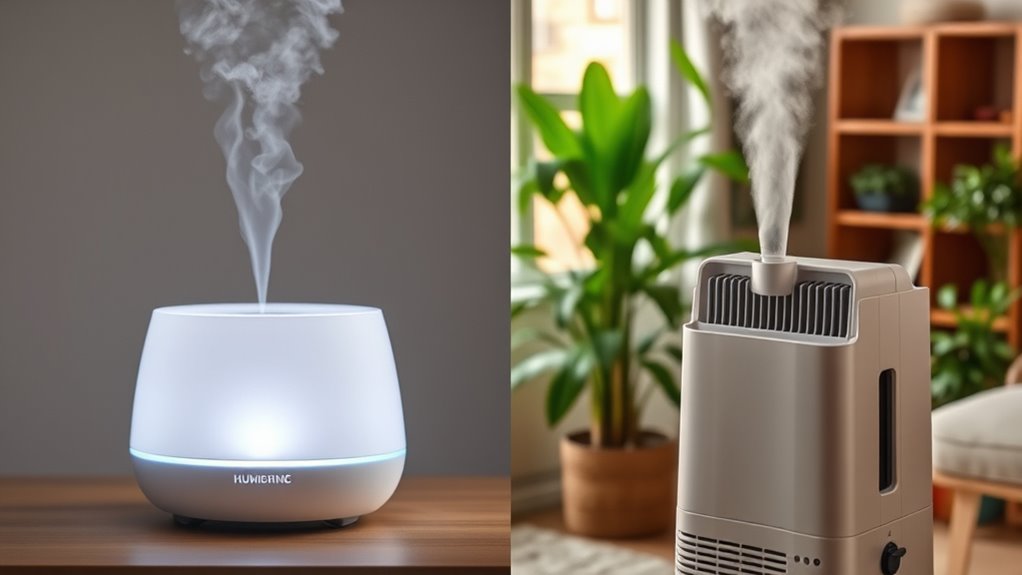
Both ultrasonic and evaporative humidifiers have distinct advantages and drawbacks that can influence your choice depending on your needs. Ultrasonic humidifiers operate quietly and are energy-efficient, making them ideal for small rooms or personal use. However, they can emit white dust from mineral deposits in tap water, which may require using distilled water to minimize. They also need regular cleaning to prevent buildup. Additionally, ultrasonic models often generate fine mist that can disperse minerals into the air, making water quality important. Some models incorporate advanced humidification technology to improve mist quality and efficiency. Evaporative humidifiers naturally regulate moisture in the air and are less likely to produce white dust, but they tend to be noisier and require frequent filter replacements, increasing maintenance. These units are typically larger, suited for bigger spaces, and can handle consistent humidity levels. Moreover, some models incorporate smart features like WiFi connectivity to monitor and adjust humidity levels remotely. Your choice depends on your room size, tolerance for noise, and willingness to manage filter replacements or mineral deposit buildup.
Key Differences in Performance and Maintenance
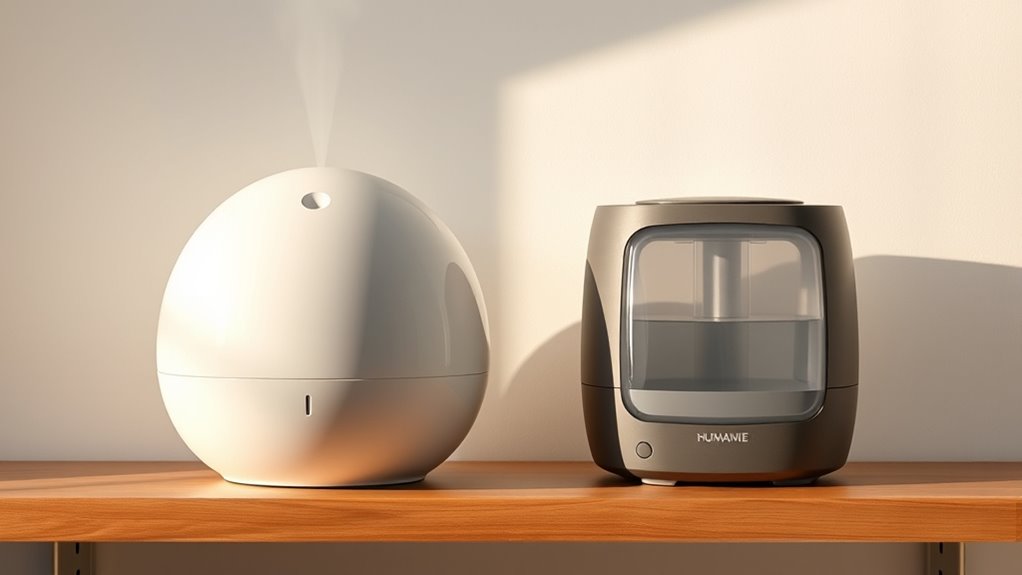
When choosing a humidifier, understanding the differences in performance and maintenance is essential. Ultrasonic humidifiers operate quietly with noise levels below 30 decibels and typically have larger water tanks for extended use, making them ideal for small to medium spaces. They don’t require filters, reducing ongoing maintenance costs, but need frequent cleaning to prevent mineral dust buildup and mold growth. Proper cleaning is crucial to maintain optimal performance and air quality. Evaporative humidifiers produce more noise, ranging from 28 to 45 decibels, due to their fans. They require regular filter replacements every 1-3 months, which trap minerals and minimize dust. Both types demand diligent cleaning to avoid bacteria buildup, but ultrasonic units often need more frequent attention. Incorporating smart capabilities can help monitor air quality and optimize operation, further enhancing maintenance efficiency. Additionally, selecting a model with air quality sensors can provide real-time feedback, ensuring healthier indoor environments.
Which Humidifier Is Better for Your Needs
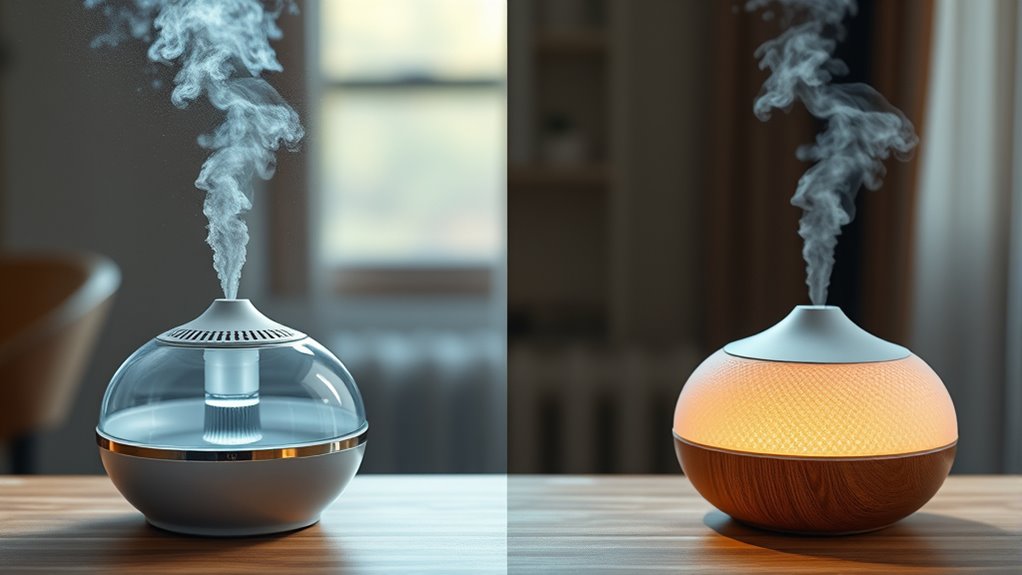
Choosing the right humidifier depends largely on your specific needs and room size. If you prioritize quiet operation and a compact design, ultrasonic humidifiers are ideal, especially for bedrooms or small spaces. They produce less noise and are energy-efficient, but may disperse minerals if your water isn’t purified, leading to white dust. On the other hand, evaporative humidifiers naturally regulate humidity levels and are better suited for larger rooms. Their filter system reduces mineral content and white dust, improving indoor air quality. Evaporative models also handle water evaporation more effectively in bigger areas. Consider your priorities: if noise level and size matter most, go ultrasonic. If you need larger coverage and natural humidity regulation, an evaporative humidifier is your best choice. Additionally, understanding the digital literacy aspects of modern appliances can help you optimize their use and maintain a healthy indoor environment. Recognizing how different sound frequencies impact device performance can also enhance your overall experience with humidifiers. Being aware of humidifier store hours can help you plan your purchases more efficiently. Moreover, selecting a model with energy efficiency features can reduce your electricity bills and environmental impact over time.
Tips for Choosing the Right Humidifier
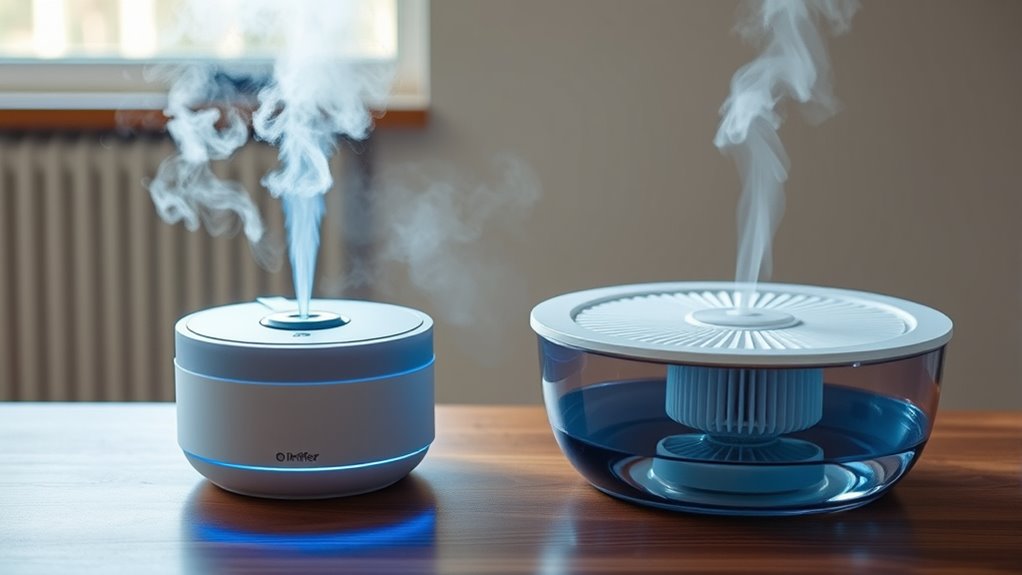
Selecting the right humidifier depends on evaluating your room size, noise preferences, and maintenance willingness. For small to medium spaces, ultrasonic humidifiers are ideal due to their quiet operation and compact humidifier size, while evaporative models suit larger areas better. Consider the water type: ultrasonic units work best with distilled or demineralized water to prevent mineral deposits, whereas evaporative units handle tap water more effectively. Noise level is essential—ultrasonic models operate below 30 decibels, perfect for bedrooms, but evaporative units produce more noise from fans. Also, think about maintenance: ultrasonic humidifiers require regular cleaning but no filter replacement, unlike evaporative models needing filter changes every 1-3 months. Prioritize safety features, humidity control, and ease of cleaning to match your specific needs. Understanding humidifier types can help you make an informed decision. Additionally, being aware of industry trends can assist in selecting the most technologically advanced and efficient models available today. For example, some models now incorporate AI-powered features to optimize humidity levels and maintenance alerts. Furthermore, considering the performance differences between humidifier types can guide you toward the best option for your environment. To ensure optimal performance, it’s also important to understand humidifier maintenance practices to keep your device functioning properly.
Frequently Asked Questions
Which Is Better, an Ultrasonic or an Evaporative Humidifier?
When choosing between ultrasonic and evaporative humidifiers, consider your needs. If you want a quiet, energy-efficient unit for a small, peaceful space, an ultrasonic model suits you best. However, if you prefer natural humidity regulation and have a larger area, an evaporative humidifier works better, despite the noise. Think about maintenance, water quality, and room size to decide which type aligns with your lifestyle and environment.
What Is the Disadvantage of an Ultrasonic Humidifier?
The disadvantage of an ultrasonic humidifier is that it can produce white dust from minerals in tap water, which settles on furniture and may cause respiratory issues. You also need to clean it regularly to prevent bacteria and mold buildup inside. Using tap water instead of distilled water accelerates mineral deposits, reducing the device’s lifespan and potentially releasing contaminants into your indoor air if not maintained properly.
What Are the Benefits of an Ultrasonic Humidifier?
Imagine you’re in the age of steam, but today, ultrasonic humidifiers bring modern benefits. They operate quietly, so you won’t be disturbed while sleeping or working. You enjoy energy efficiency, larger water tanks for longer use, and no filters to worry about. Plus, they can produce both cool and warm mist, fitting your comfort needs. Compact and feature-rich, ultrasonic humidifiers are perfect for enhancing your room’s air quality effortlessly.
Can I Use Tap Water in an Evaporative Humidifier?
Yes, you can use tap water in an evaporative humidifier. These units are designed to handle mineral content because their wick filters trap impurities and mineral dust, preventing them from dispersing into the air. Just remember to regularly clean or replace the wick filter to avoid mineral buildup and mold. If your water’s very hard, consider using distilled or demineralized water for ideal performance and less maintenance.
Conclusion
Choosing between ultrasonic and evaporative humidifiers depends on your specific needs. Ultrasonic models are quieter and energy-efficient, while evaporative units tend to be more self-regulating and easier to maintain. Did you know that evaporative humidifiers can add moisture up to 10 times faster than ultrasonic ones? By understanding these differences, you can select the perfect humidifier for your space, ensuring comfortable, healthy air without the hassle. Make your choice confidently for ideal comfort!




